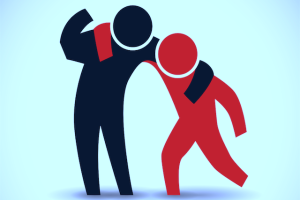Dissociation and disassociation are two words that are often confused with each other. However, there is a big difference between the two terms. In this article, we will explore the definition of dissociation and disassociation, as well as their key differences. We will also discuss the symptoms and causes of both disorders. By the end of this article, you will have a clear understanding of the difference between dissociation and disassociation!
Contents
- 1 What Is Dissociation?
- 2 What Is Disassociation?
- 3 Difference in Symptoms Of Dissociation And Disassociation
- 4 Difference in Reasons For Dissociation And Disassociation
- 5 Difference in Negative Impact Of Dissociation And Disassociation
- 6 Difference in Treatment Options For Dissociation And Disassociation
- 7 Differences in Self Care Tips For Dissociation And Disassociation
- 8 Helping Someone Who Is Going Through Dissociation And Disassociation
- 9 Conclusion
- 10 A Word From Therapy Mantra
What Is Dissociation?

Dissociation is when your thoughts, feelings, memories, and identity are separate from the rest of your body. Dissociation is when someone feels like they are not themselves. This can happen in different ways, like memory loss or traveling without remembering where they went. Dissociation is when someone doesn’t feel like they are truly themselves. It can happen after a difficult experience, and it gives the person a way to cope with that experience.
What Is Disassociation?

Disassociation is when you detach yourself from your surroundings or from reality. This can manifest in different ways, such as feeling numb, feeling like you’re watching yourself from outside your body, or experiencing hallucinations. Disassociation occurs when someone has experienced a traumatic event that they have been unable to process. As a result, they disconnect themselves from the experience in order to survive.
Difference in Symptoms Of Dissociation And Disassociation
Symptoms Of Dissociation
- Feeling disconnected from your body or thoughts: When you dissociate, you may feel like you’re watching yourself from afar or that your thoughts and emotions don’t belong to you. You may also feel numb or disconnected from your body.
- Memory lapses: You may have trouble remembering important details of your life or recent events.
- Experiencing different personalities or voices: When you dissociate, you may feel like you have different personalities or voices inside your head. These “voices” can control your thoughts and actions and can be very distressing.
- Hallucinations or delusions: Some people who dissociate may experience hallucinations (seeing or hearing things that aren’t there) or delusions (believing things that aren’t true).
Symptoms Of Disassociation
- Feeling as though you are watching yourself from outside your body: When you disassociate, you may feel as though you are watching yourself from outside your body. This can be a very distressing experience.
- Seeing yourself from a distance or in a mirror: You may see yourself from a distance or in a mirror as if you are looking at someone else.
- Feeling that your thoughts and emotions don’t belong to you: When you disassociate, you may feel that your thoughts and emotions don’t belong to you. This can be a very distressing experience.
- Memory problems: You may have trouble remembering important details of your life or recent events.
- Hearing voices that aren’t there: You may hear voices that aren’t there when you disassociate.
- Not recognizing people you know well: You may not recognize people you know well when you disassociate.
- Difficulty speaking, swallowing, or moving limbs: You may have difficulty speaking, swallowing, or moving limbs when you disassociate. This can be very frightening and distressing.
Difference in Reasons For Dissociation And Disassociation
Reasons For Dissociation

Dissociation can be a way to cope with traumatic experiences that someone has been unable to process. When you dissociate, you disconnect yourself from the experience in order to survive. This can be a way to protect yourself from the trauma.
Reasons For Disassociation
Disassociation can be a way to cope with traumatic experiences that someone has been unable to process. When you disassociate, you detach yourself from your surroundings or from reality. This can manifest in different ways, such as feeling numb, feeling like you’re watching yourself from outside your body, or experiencing hallucinations. As a result, someone who is disassociated may find it difficult to interact with others and experience the world around them.
Which Is More Distressing?
Dissociation is when someone disconnects themselves from their thoughts and emotions. Disassociation is when someone detaches themselves from reality. Many people find having different personalities or hearing voices in their heads to be very upsetting. But for some people, it can be even worse if they also forget who they are. Additionally, people who dissociate may have trouble remembering important details of their life or recent events.
Difference in Negative Impact Of Dissociation And Disassociation
Negative Impact Of Dissociation

Dissociation is a coping mechanism that can have a negative impact on one’s life. It can lead to feeling detached from one’s body, thoughts, and emotions. This can make it difficult to interact with others and function in everyday life. Additionally, dissociation can increase the risk of developing mental health disorders such as depression and anxiety.
Negative Impact Of Disassociation
Disassociation is also a coping mechanism that can have a negative impact on one’s life. However, disassociation tends to have a more severe effect than dissociation. This is because disassociation often leads to disconnection from reality. This can cause problems in relationships, school/work performance, and overall quality of life. Additionally, disassociation can increase the risk of developing mental health disorders such as psychosis.
Which Is More Common?
Dissociation is more common than disassociation. This is because dissociation is a way to cope with any type of trauma. It can be used in response to anything. Disassociation is what happens when someone has delusions or hallucinations.
Difference in Treatment Options For Dissociation And Disassociation
Treatment Options For Dissociation

Treatment for dissociation often includes therapy and medications. Therapy can help someone process the traumatic experiences that they have been unable to deal with. This can help reduce the amount of dissociation a person experiences. Medications may be prescribed to help manage symptoms such as depression, anxiety, or mood swings.
Treatment Options For Disassociation

There is no one-size-fits-all approach to treating disassociation. However, some treatments that have been shown to be effective include cognitive-behavioral therapy (CBT), dialectical behavior therapy (DBT), and eye movement desensitization and reprocessing (EMDR).
- Cognitive-behavioral therapy (CBT): CBT is a type of therapy that helps people change the way they think and behave.
- Dialectical behavior therapy (DBT): DBT is a type of therapy that helps people manage their emotions.
- Eye Movement Desensitization and Reprocessing (EMDR): EMDR is a type of therapy that uses eye movements to help people process traumatic memories.
Differences in Self Care Tips For Dissociation And Disassociation
Self Care Tips For Dissociation

If you are feeling dissociated, here are some self-care tips that may help:
- Ground yourself by focusing on your body and the sensations you feel. This can be done by focusing on your breath, feeling the weight of your body against the ground or chair, or noticing the sensations in your hands and feet.
- Distract yourself from your thoughts by focusing on a task. This can be something as simple as folding laundry, washing dishes, or taking a walk.
- Talk to someone you trust about how you’re feeling. This can help you process what you’re going through and may make it less overwhelming.
- Take a break from electronics and social media. These can be triggers for dissociation.
- Engage in calming activities such as meditation or yoga.
- Stay hydrated and eat healthy foods. These can help to boost your mood and energy.
Self Care Tips For Disassociation
If you are feeling disassociated, here are some self-care tips that may help:

- Stay connected to reality as much as possible. Grounding exercises can help you stay connected to your body and the present moment.
- Stay hydrated. Drink plenty of fluids throughout the day.
- Avoid caffeine and alcohol. Caffeine and alcohol can worsen disassociation.
- Get enough sleep. When you’re tired, it’s harder to stay grounded.
- Eat healthy foods. Eating nutritious foods can help boost your energy and mood.
- Participate in activities that you enjoy. Doing things you love can help ground you and connect you to the present moment.
- Talk to somebody you trust about how you’re feeling. Talking openly and honestly can be helpful in managing disassociation.
- Take breaks throughout the day to relax and rejuvenate. Take a few deep breaths. Stretch. Meditate. Listen to calming music. Spend time in nature.
- Avoid situations that could trigger your delusions or hallucinations.
Which is More Dangerous?
Dissociation is more dangerous than disassociation. This is because dissociation can lead to someone disconnecting from reality. This can cause them to act out in harmful ways and make poor decisions. Additionally, dissociation can increase the risk of developing mental health disorders such as psychosis.
Helping Someone Who Is Going Through Dissociation And Disassociation

If you know somebody who is going through dissociation or disassociation, here are some things you can do to help:
- Listen without judgment. Let them know that you support them and are there for them.
- Avoid triggers. If there are certain things that trigger their dissociation or disassociation, try to avoid those things.
- Encourage them to seek professional help. Sometimes it can be helpful to see a therapist or counselor who can provide additional support.
- Be patient and understanding. It may take time for them to heal and recover.
Conclusion
Dissociation is when you think about something that happened, but it feels like it wasn’t your fault. It happens when you try to forget what happened. There are two types of suppression: voluntary and involuntary. Voluntary suppression is when you choose to ignore something. This can be helpful in coping with difficult situations or memories. Involuntary suppression is when something is automatically hidden from your mind.
For example, someone who has experienced a traumatic event may dissociate from their body in order to avoid feeling the pain associated with the event. If a person doesn’t have a sense of self, they may have a disorder. A disorder is when you have trouble remembering things, getting your emotions back on track, or losing your consciousness. People with disassociation disorder often feel like they are watching themselves from outside their body or have trouble distinguishing between reality and fantasy. This can be really confusing and scary. If you think you might have disassociation disorder or dissociation, it is important to reach out for help. There are many resources available that can provide support and guidance.
Dissociation is more dangerous than disassociation. This is because dissociation can lead to someone disconnecting from reality. This can cause them to act out in harmful ways and make poor decisions. Additionally, dissociation can increase the risk of developing mental health disorders such as psychosis.
A Word From Therapy Mantra
Your mental health — Your psychological, emotional, and social well-being — has an impact on every aspect of your life. Positive mental health essentially allows you to effectively deal with life’s everyday challenges.
At TherapyMantra, we have a team of therapists who provide affordable online therapy to assist you with issues such as depression, anxiety, stress, workplace Issues, addiction, relationship, OCD, LGBTQ, and PTSD. You can book a free therapy or download our free Android or iOS app.


